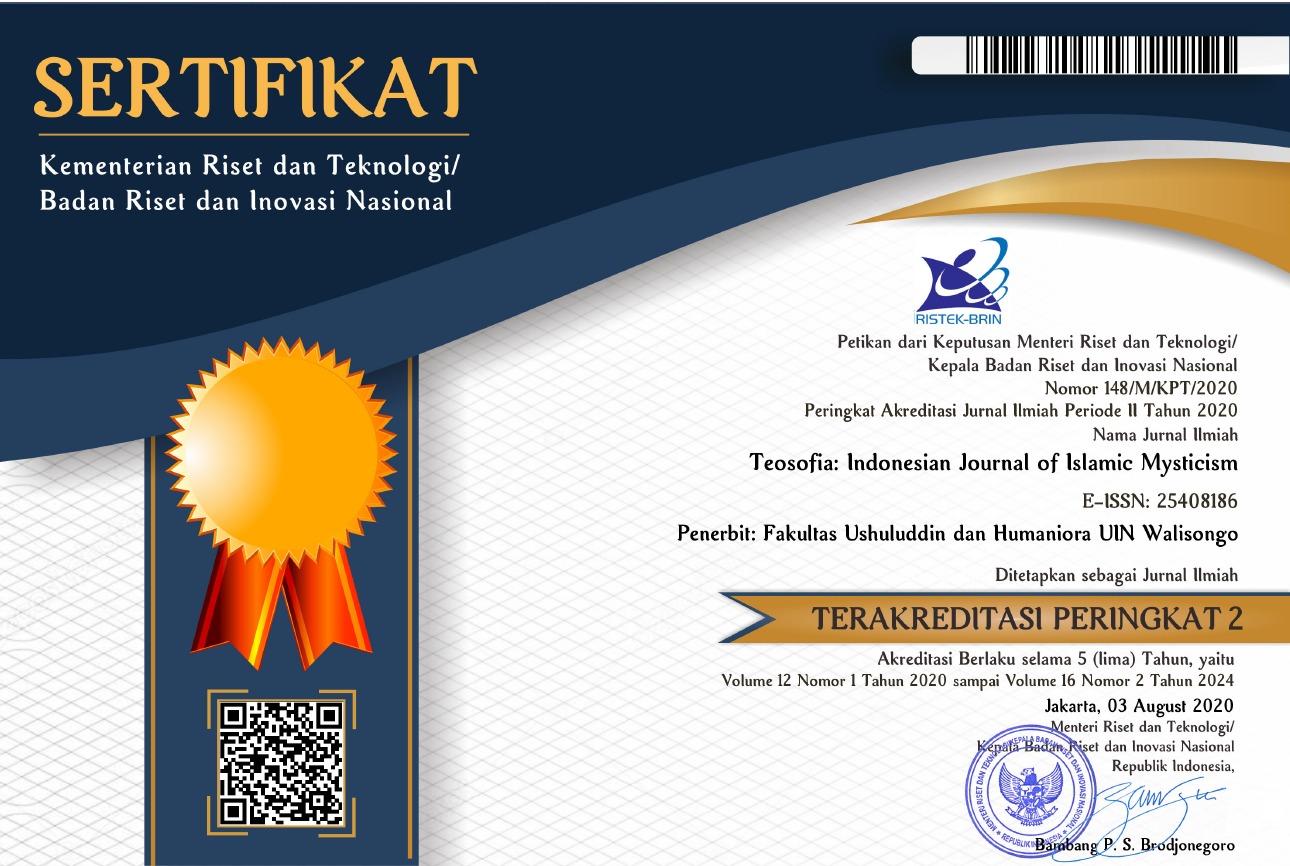THE SPIRIT OF RECIPROCITY VERSES IN THE QURAN AS A SOLUTION TO COUNTER RELIGIOUS RADICALISM
DOI:
https://doi.org/10.21580/tos.v8i1.5306Keywords:
diversity, religious radicalism, mutual, verse reciprocity, radicalism solutionAbstract
The diversity of religions necessitates the recognition and respect of religions other than ours. Islam is a religion that is peaceful and full of love. The spread of radicalism in religious communities in Indonesia illustrates the lack of tolerance in the recognition of religious diversity and the religious diversity of others. This literary research uses a qualitative approach with content analysis and comprehensive interpretation for the Qur'anic text about reciprocity verses. This study concludes that the Qur'an provides enthusiasm and solutions in terms of management and counteracts religious radicalism in the spirit of 'mutual'. Recitation of reciprocal verses as illustrated by the Quran with the editorial and unique arrangement of language in the al-Nisa’ verse 86 and al-An'am verse 108 provides a 'mutual' solution. The principle of mutual respect (al-Nisa ': 86) and not berating each other (al-An'am: 108) with a better attitude in religious life.
Downloads
References
Abbas, Tahir, and Assma Siddique. “Perceptions of the Processes of Radicalisation and De-Radicalisation among British South Asian Muslims in a Post-Industrial City.” Social Identities, 2012. https://doi.org/10.1080/13504630.2011.629519.
Acemoglu, Daron, Davide Cantoni, Simon Johnson, and James A. Robinson. “The Consequences of Radical Reform: The French Revolution.” American Economic Review, 2011. https://doi.org/10.1257/aer.101.7.3286.
Ali, Muhamad. “Muslim Diversity: Islam and Local Tradition in Java and Sulawesi, Indonesia.” Indonesian Journal of Islam and Muslim Societies, 2011. https://doi.org/10.18326/ijims.v1i1.1-35.
Basalim, Umar. “MENELUSURI AKAR RADIKALISME.” Ilmu Dan Budaya, 2015.
D.S. “Charles James Fox.” Notes and Queries, 1865. https://doi.org/10.1093/nq/s3-VIII.201.370-b.
Doosje, Bertjan, Fathali M. Moghaddam, Arie W. Kruglanski, Arjan de Wolf, Liesbeth Mann, and Allard R. Feddes. “Terrorism, Radicalization and de-Radicalization.” Current Opinion in Psychology, 2016. https://doi.org/10.1016/j.copsyc.2016.06.008.
FAIQAH, NURUL, and TONI PRANSISKA. “Radikalisme Islam Vs Moderasi Islam: Upaya Membangun Wajah Islam Indonesia Yang Damai.” Ejournal.Uin-Suska.Ac.Id, 2018.
Fakhruddin al Razi. Tafsir Al Fakhri Al Razi: Mafatih Al Gaib. Beirut: Dar Al Fikr, 1981.
Fakri, Muhamamad. “Wawasan Kerukunan Beragama Di Indonesia.” Agama, 2013.
Falk, Armin, and Urs Fischbacher. “A Theory of Reciprocity.” Games and Economic Behavior, 2006. https://doi.org/10.1016/j.geb.2005.03.001.
Galtung, Johan. “Religions Hard and Soft.” In The Ashgate Research Companion to Religion and Conflict Resolution, 2012.
Gambetta, Diego, and Steffen Hertog. Engineers of Jihad: The Curious Connection between Violent Extremism and Education. Engineers of Jihad: The Curious Connection between Violent Extremism and Education, 2016.
Hasan, Noorhaidi. “Reformasi, Religious Diversity, and Islamic Radicalism after Suharto.” Journal of Indonesian Social Sciences and Humanities, 2008.
Heck, Axel. “Images, Visions and Narrative Identity Formation of ISIS.” Global Discourse, 2017. https://doi.org/10.1080/23269995.2017.1342490.
Horgan, John. Walking Away from Terrorism: Accounts of Disengagement from Radical and Extremist Movements. Walking Away from Terrorism: Accounts of Disengagement from Radical and Extremist Movements, 2009. https://doi.org/10.4324/9780203874738.
Kasir, Ibnu. Tafsir Alquran Al Adhim. Juz 4. Beirut: Dar Al Fikr, 2005.
Lugo, Luis, Alan Cooperman, Jessica Hamar Martinez, Besheer Mohamed, Michael Robbins, Neha Sahgal, and Katie Simmons. “The World’s Muslims : Unity and Diversity.” Pew Research Center, 2012.
Magnis-Suseno, Franz. “Christian and Muslim Minorities in Indonesia.” In Democracy and Islam in Indonesia, 2015. https://doi.org/10.7312/columbia/9780231161916.003.0004.
“Mausu’ah Al Hadis Syarif Fi Kutub Tis’ah.” al-Baramij Syirkah islamiyah al Duliyah, n.d. http://www.almeshkat.net/books/open.php?cat=37&book=2293.
Mazrui, Ali A. “Islam, Political Leadership and Economic Radicalism in Africa.” Comparative Studies in Society and History, 1967. https://doi.org/10.1017/S0010417500004539.
O’Neill, Michael. “‘A Double Face of False and True’: Poetry and Religion in Shelley.” Literature and Theology, 2011. https://doi.org/10.1093/litthe/frq067.
Ömer Taşpınar. “Fighting Radicalism, Not ‘Terrorism’: Root Causes of an International Actor Redefined.” SAIS Review, 2009. https://doi.org/10.1353/sais.0.0059.
Pedersen, Lene. “Religious Pluralism in Indonesia.” Asia Pacific Journal of Anthropology, 2016. https://doi.org/10.1080/14442213.2016.1218534.
Pieter, Jeneman, and John A Titaley. “Hubungan Antar Agama Dalam Kebhinekaan Indonesia (Studi Kasus Terhadap Hubungan Warga Jemaat GPIB Tamansari Pospel Kalimangli Dengan Warga Muslim Di Dusun Kalimangli).” Waskita: Jurnal Studi Agama Dan Masyarakat, 2013.
Porta, Donatella Della, and Gary LaFree. “Guest Editorial: Processes of Radicalization and de-Radicalization.” International Journal of Conflict and Violence, 2012. https://doi.org/10.4119/UNIBI/ijcv.266.
Qurtuby, Sumanto Al. “A Camouflage for Religious Violence.” Jakarta Globe, 2012.
Rooduijn, Matthijs, and Brian Burgoon. “The Paradox of Well-Being: Do Unfavorable Socioeconomic and Sociocultural Contexts Deepen or Dampen Radical Left and Right Voting Among the Less Well-Off?” Comparative Political Studies, 2018. https://doi.org/10.1177/0010414017720707.
Sabuni, Muhammad Ali. Safwatu Al Tafasir. Jilid 2. Beirut: Dar Alquran Al Karim, 1999.
Sari, Abi Ishaq Ibrahim al. Ma’anil Quran Wa I’rabuhu. Edited by Tahqiq: Abdul jalil Abd Sulbi. Beirut: Alam al Kutub, n.d.
Sayyid Qutb. Tafsȋr Fȋ Zhilȃl Al Qur’an. Cairo: Dar as Syuruq, 1992.
Schmid, Alex. “Radicalisation, De-Radicalisation, Counter-Radicalisation: A Conceptual Discussion and Literature Review.” Terrorism and Counter-Terrorism Studies, 2013. https://doi.org/10.19165/2013.1.02.
Sekulow, Jay. “The Rise of ISIS and the New Caliphate.” In Rise of ISIS: A Threat We Can’t Ignore, 2014.
Shihab, M. Quraish. Tafsir Al Misbah. Jakarta: Lentera Hati, 2002.
Snow, David, and Remy Cross. “Radicalism within the Context of Social Movements: Processes and Types.” Journal of Strategic Security, 2011. https://doi.org/10.5038/1944-0472.4.4.5.
Walton, C. Dale. “A Review of ‘Routledge Handbook of Political Islam.’” Comparative Strategy, 2012. https://doi.org/10.1080/01495933.2012.665726.
Wiktorowicz, Quintan. “Joining the Cause: Al Muhajiroun and Radical Islam.” In Roots of Islamic Rad Icalism, 2004.
Wilke, Thomas. “„Fuck the Gods“: Moral, Religion Und Religiosität,” 2019. https://doi.org/10.1007/978-3-658-11747-4_10.
Yoder, Keith J., and Jean Decety. “The Good, the Bad, and the Just: Justice Sensitivity Predicts Neural Response during Moral Evaluation of Actions Performed by Others.” Journal of Neuroscience, 2014. https://doi.org/10.1523/JNEUROSCI.4648-13.2014.
Downloads
Published
How to Cite
Issue
Section
License
Copyright
The copyright of the received article shall be assigned to the journal as the publisher of the journal. The intended copyright includes the right to publish the article in various forms (including reprints). The journal maintains the publishing rights to the published articles. Therefore, the author must submit a statement of the Copyright Transfer Agreement.*)
Licensing

This work is licensed under a Creative Commons Attribution-ShareAlike 4.0 International License.
In line with the license, authors are allowed to share and adapt the material. In addition, the material must be given appropriate credit, provided with a link to the license, and indicated if changes were made. If authors remix, transform or build upon the material, authors must distribute their contributions under the same license as the original.
_______
*) Authors whose articles are accepted for publication will receive confirmation via email and send a Copyright Transfer Agreement.









